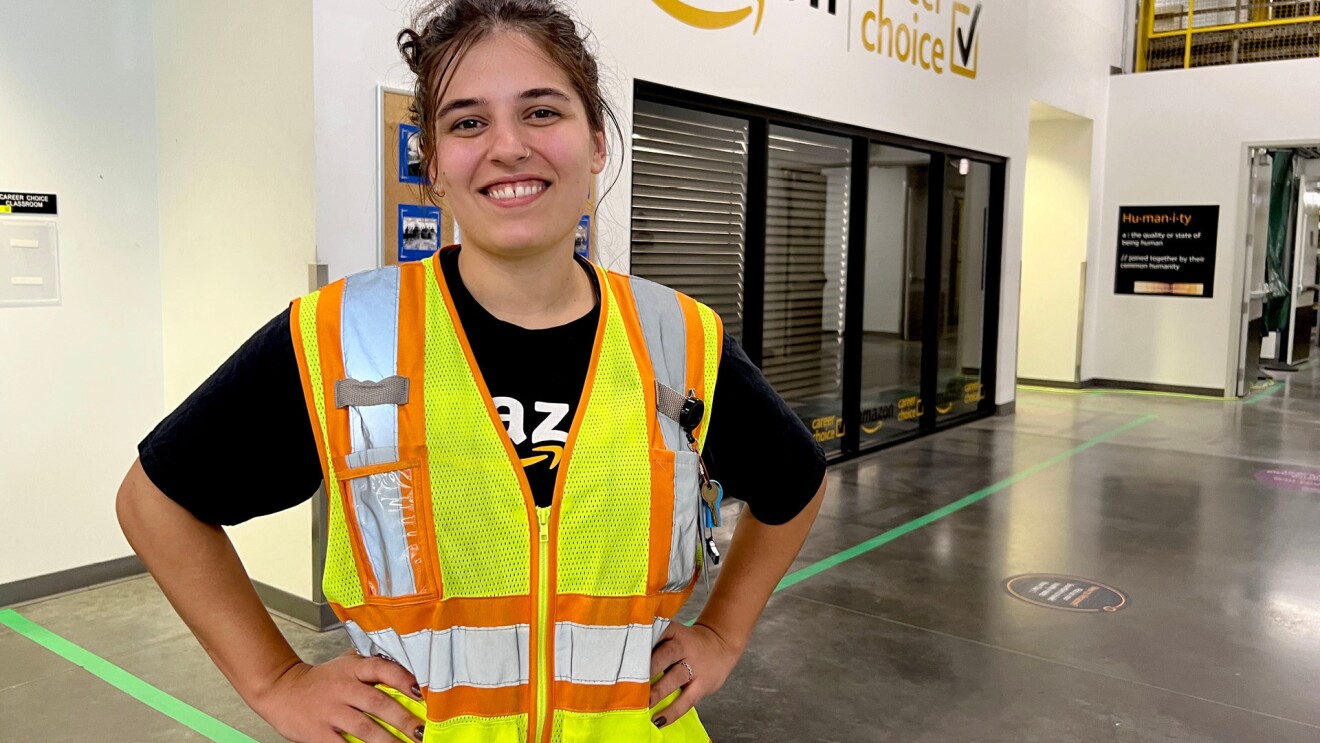As more and more tools become available at the intersection of hiring and artificial intelligence (AI) or machine learning (ML), we sometimes get questions about what they are and how we use them, so we wanted to share a bit more. Over the last several years, we’ve built tools using AI and ML to help job applicants throughout the hiring process—from identifying the right position to apply for, to giving them more flexibility through online assessments that help us engage and evaluate candidates—all while driving equity and fairness in the hiring process and adhering to legal standards.
Using technology to hire and develop the best
At Amazon, we talk a lot about Hiring and Developing the Best. It’s one of our Leadership Principles, which inform everything we do, and it’s core to our culture of continuous growth and innovation. Part of Hiring and Developing the Best is approaching our hiring processes with the same builders’ mindset that we use to deliver for customers. Our People eXperience and Technology (PXT) teams are always innovating on behalf of customers and Amazon employees—thinking big about how we build inclusive, technology-driven solutions that drive scalable hiring processes and equitable candidate experiences, reduce potential bias, and enhance the capabilities of our recruiting teams.*
Supporting job seekers in discovering potential roles
With ML, we can help potential candidates find the most relevant role for them to apply to from the very beginning of their search. For example, on amazon.jobs (our careers page), a candidate can search for roles by titles, keywords, and location. As a user browses the search results, our behavior-driven machine learning algorithms provide real-time recommendations for relevant roles on the job detail page from our full catalog of available positions.
Identifying the best skills and experience fit
As a candidate’s journey continues, the right role for some candidates can be more quickly identified thanks to ML. For example, when incoming Amazon interns and new college grads are interested in full-time roles, the system automatically recommends roles that match their interests, skills, and experience. These candidates have skills that could apply to a number of roles, and we identify interests based on natural language processing of the candidates' resumes. We then suggest relevant roles to the recruiter that match the candidates' interests according to a machine learning algorithm. For example, a candidate's resume may mention their interest in embedded systems, which could result in suggesting a role on an Alexa team.
A team of scientists continuously monitors the recommended matches to ensure fairness, and our recruiting team reviews all recommendations to confirm that they reflect the best fit for long-term success at Amazon.
Better engaging candidates with online assessments
We also use online assessments to engage, inform, and evaluate candidates in our process. These research-backed assessments are designed to objectively measure critical knowledge, skills, and abilities required on the job, and our research shows that they drive more equitable and inclusive outcomes across identity groups. This gives candidates greater flexibility since they can take the assessment online instead of waiting for a phone screen to be scheduled to move forward in the process. Our research shows that when online assessments are used consistently in hiring processes, they yield higher numbers of diverse hires than when assessments are not used, and they do so with greater efficiency and accuracy.
Reviewing applications for select roles
For some specific types of roles, we use machine learning to identify candidates that can move forward in our hiring process based on their skills and other qualifications—without having to wait for a resume review by a recruiter. All other candidates’ resumes are referred to our recruiting team for review and considered for next steps based on the candidate’s likelihood to be successful. We’ve seen that candidates who are successful in the hiring process tend to be more diverse when this tool is used, and data shows that the tool increases the number of applicants who reach the next step in the interview process (and ultimately join Amazon), and does so fairly.
Fostering greater equity
Like many Amazon processes, these AI- and ML-based hiring tools have been developed and used responsibly to foster continued innovation and earn candidate trust. It’s especially essential that tools used in hiring be developed, implemented, and monitored in accordance with legal requirements as well as scientific and industry best practices. We regularly conduct rigorous analyses of these tools’ outcomes to ensure they are similarly benefiting all demographic groups.
We also go beyond legal and industry standards with our commitment to build technology that is “born inclusive." For us, “born inclusive” means focusing on equity in every stage of product development and inspecting outcomes for candidates across all identity groups.
As part of this process, we start with user research—diving deep to understand the context for our tools from diverse and representative perspectives and experiences. Prior to launching any new tool, we conduct studies ensuring that the tool is similarly benefiting individuals from diverse identity groups. And once tools are in use, we rigorously monitor their performance to ensure the tool is delivering comparable outcomes across gender and race identities.
We believe that technology can drive fairer application processes by focusing on skills and job requirement fundamentals, and measuring and minimizing bias algorithmically, and we’re proud of how we’re innovating in this space. It’s part of our commitment to have the same diversity, equity, and inclusion focus built in to our recruiting tools that we have in other Amazon innovations.
What’s next?
We’re not done with this work yet, and we plan to continuously raise the bar while making our hiring processes even fairer and faster. We’re very excited for what’s ahead, and we’re proud of our innovations for candidates as we continue to Hire and Develop the Best.
*These tools are not used in jurisdictions where local law does not allow them.
Trending news and stories










